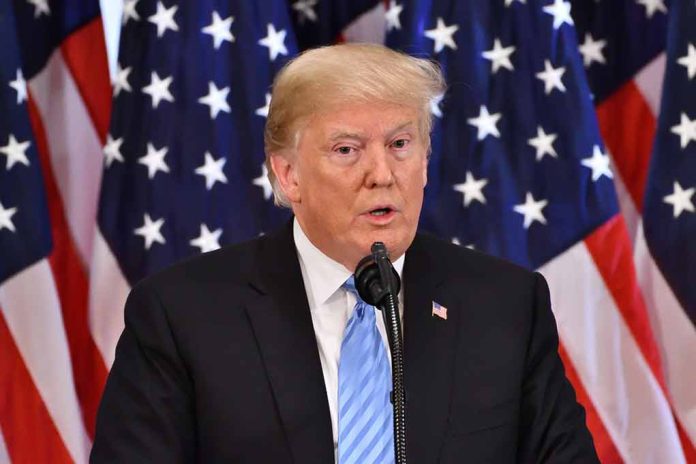
President Trump imposes tariffs on Canada, Mexico, and China, citing the contraband crisis and illegal immigration.
Key Takeaways
- Trump signed an executive order imposing tariffs on goods from Canada, Mexico, and China to address contraband trafficking and illegal immigration.
- The tariffs, set at 25% for most goods and 10% for Canadian energy products, may lead to higher prices for U.S. consumers.
- The move has sparked concerns about potential disruptions to supply chains and the future of the USMCA trade agreement.
- Some experts argue that the tariffs may not effectively address the stated issues and could have negative economic consequences.
Trump’s Executive Order: Targeting Contraband and Immigration
In a move aimed at avoiding a trade war, President Donald Trump announced a 30-day pause on tariffs against Canada and Mexico on Monday, following significant steps taken by both countries to address U.S. concerns about border security and drug trafficking. The temporary suspension of tariffs, which had been set to go into effect earlier, gives the two North American neighbors time to negotiate a more comprehensive agreement. While the pause offers relief for now, the global economy remains uncertain, as the possibility of renewed tariffs—particularly on China and the European Union—continues to loom large.
The tariffs are set at 25% for most goods, with a lower rate of 10% for Canadian energy products to minimize potential impacts on gasoline and home heating oil prices. This move expands the national emergency previously declared at the southern border to include perceived threats from the northern border as well.
FOR IMMEDIATE RELEASE
02/01/25
Fact Sheet: President Donald J. Trump Imposes Tariffs on Imports from Canada, Mexico, and ChinaADDRESSING AN EMERGENCY SITUATION: The extraordinary threat posed by illegal aliens and drugs, including deadly fentanyl, constitutes a national…
— Sharyl Attkisson 🕵️♂️💼🥋 (@SharylAttkisson) February 2, 2025
Justification and Criticism
The Trump administration has justified these tariffs as necessary to protect American citizens and national security. A senior administration official stated, “This is a beautiful, beautiful example of promises made, promises kept by President Trump.” The White House emphasized the urgency of the situation, with Trump asserting, “We need to protect Americans, and it is my duty as President to ensure the safety of all.”
“A Nation without borders is not a nation at all.” – Donald J. Trump
However, the move has faced criticism from various quarters. NPR reported that some of Trump’s statements about the contraband crisis, particularly regarding Canada’s role, were false. The report noted that the contraband crisis had actually been improving, with overdose deaths dropping by over 21% since June 2023.
Economic Implications
Economists predict that these tariffs will likely increase consumer prices for various goods, as companies importing into the U.S. will bear the costs. Industries such as automotive, construction, and food supply chains are particularly vulnerable to these changes. The United Auto Workers union and other labor organizations have expressed concerns about the tariffs’ impact on workers and industries.
“The only products exempt from the tariffs are Canadian energy products, which would have a lower tariff rate of 10% to “minimize any disruptive effects we might have on gasoline and home heating oil prices,”” – a senior administration official
The tariffs could also jeopardize the United States-Mexico-Canada Agreement (USMCA), which currently allows for tariff-free movement of products between the three countries. There are concerns that retaliatory measures from Canada and Mexico could make U.S. products less competitive in those markets, affecting U.S. exports.
International Response and Future Implications
The executive order allows for potential increases in tariffs if Canada retaliates, indicating a readiness for potential escalation. It also mandates regular consultation between U.S. officials to assess Canada’s cooperation in addressing the crisis. The Secretary of Homeland Security is authorized to implement the order and report to Congress.
As the situation unfolds, it remains to be seen how effective these measures will be in addressing the stated concerns of drug trafficking and illegal immigration. The economic impact on U.S. consumers and businesses, as well as the potential for international trade disputes, will likely be closely monitored in the coming months.
Sources:
- Trump slaps tariffs on Canada, Mexico, China, risking higher prices for U.S. consumers
- Imposing Duties to Address the Flow of Illicit Drugs Across Our Northern Border – The White House
- Trump used fentanyl to justify tariffs, but the crisis was already easing
- Trump stretches trade law boundaries with Canada, Mexico, China tariffs | Reuters














